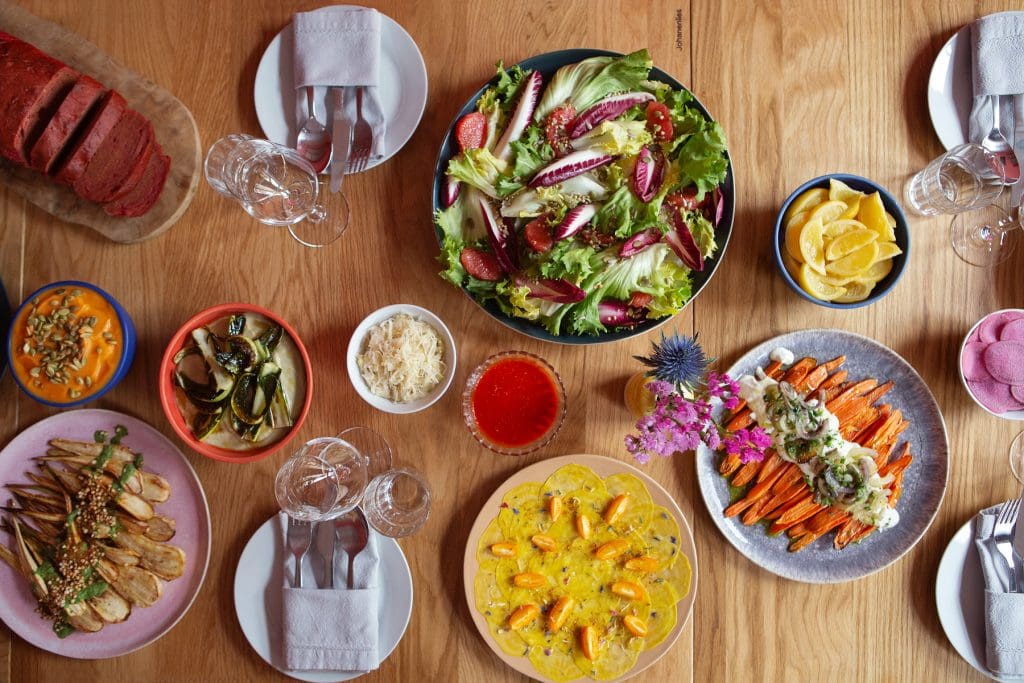Happa is so understated and unassuming you could easily walk past the low waste, plant-based restaurant without realising it. There is no large sign declaring the restaurant’s healthy and virtuous intentions, just a simple shop front stating the food on offer. Within a few moments of chatting with its co-owner Sophia Hoffman I can see why.
Happa Kreuzberg
“We serve simple good food,” says the former DJ turned vegan chef and author of four cookbooks including Zero Waste, although Sophia is keen to point out that Happa, named after the noise you make when feeding babies, is not actually zero waste. It is just too difficult to be fully zero waste she says, adding that they aim for sustainability and minimising food waste by using as much of products as they can.
Happa works closely with organisations such as Bio Company, Conflictfood and Querfeld to ensure their produce is seasonal and to minimise their carbon footprint. Querfeld provides ‘misfit’ vegetables which also helps to minimise costs, and has helped them save 3,000kg of food in 15 months. In addition they buy some goods at the local market.
Sophia is very particular about the partners she works with, making sure they share the same ethos, for instance their flour comes from regenerative farmers. Many of these suppliers Sophia has known for a long time, although they are always willing to work with new ones, such as a farm in Brandenburg that produces chickpeas – a consequence of climate change. Happa is certified organic.
Some of the dishes such as the homemade pretzel (hausgemachte brezn) are vegan takes on traditional dishes from her native Bavaria, where she worked for many years in hospitality before moving to Berlin 15 years ago, via Vienna.
Happa opened at the end of 2022, but it was a project she started planning with business partner Nina Petersen in 2017.
They chose Kreuzberg in part due to the areas vibrant mix of cultures as well as Petersen living just around the corner. Sophia explains they also felt there was room for a plant-based, seasonal organic restaurant in the area.
The property used to be a bar for 15 years. According to Sophia, it was looking a bit run down, so they wanted to put a bit of colour back into it with the design. They use upcycled furniture for the chairs and tables, and have chosen a green energy supplier while minimising their own energy consumption. The low key nature of the restaurant and kitchen is in keeping with the cool nature of Kreuzberg.
Happa Menus
Sophia explains they have put a lot of thought into the project. On Monday to Thursday they provide lunch for the many workers in the area, while on Thursday and Friday they have dinner nights, just like a bed supper club, seating 24 to 28 guests and pairing the food with wine (€65), as well as offering non-alcohol pairings. They also host plenty of private events and have a sober bar once a month.
Other nights, such as the Wednesday we visit, they offer an Aperitivo menu, offering plant-based, seasonal organic tapas dishes (€4 to €8) which you can drink with a variety of wines by the glass. The most expensive dish is the antipasti of hummus, grilled vegetables and homemade focaccia which is only €13.
We decided to order the whole menu, and still it was a very affordable. For me the stand out dish was the watermelon and tomato salad (€6) with mint and walnuts, which was incredibly light and refreshing, while my Berlin-based companion loved the potato mash with braised onion (€6) which was another traditional dish.
Berlin the Vegan Capital of Europe
Berlin is sometimes claimed to be the vegan capital of Europe, which is quite a shift considering the nation’s obsession with bratwurst and all things pig. On a previous visit I was fortunate enough to dine at FREA, a zero waste vegan restaurant, which is another driving force in the city’s vegan restaurant scene.
However, for Sophia it is not so much about forcing vegan food down people’s throats as about offering customers great food, which also happens to be vegan. Their aim is to sensitise customers into realising that vegan food can actually be tasty.
Sophia feels that part of the shift in the direction of the capital’s restaurant scene has been caused by the influx of expats that has increased the quality of both food and service. It has also reflected the global shift towards healthy and plant-based food. In Berlin, covid led to an explosion in vegan food consumption as people placed a greater emphasis on their own health.
She also believes that being vegan, as well as low waste, has made chefs more imaginative in their food offerings, although she says she has been a vegan for so long she doesn’t even know what baking a cake with eggs is like any longer.
I get the feeling that the conversation Sophia wishes to encourage at Happa is not just about the nature of food. Gender issues are equally important to her. Around the walls is an exhibition of photographs of women coffee farmers from Angelique’s Finest Coffee in Rwanda, who own their own cooperative. Also, although Sophia stresses it was never an aim, all their team is female.
So, when I ask for her inspiration it surprises me to discover it was Jamie Oliver, who she says was one of the coolest people ever when she was growing up. She adds there were no female chef role models in Germany at the time. Clearly, Delia and Nigella never cut it in Munich.
The evening flies by due to the most interesting conversation with the most inspirational chef. For dessert, I follow Sophia’s advice and opt for the lemon drizzle cake, which is full of zest, no drizzle there. I can’t have enough of it.
This ultimately is the test of any restaurant. It is all very good having the finest principles, producing plant-based planet-friendly food, but if the food is lacking flavour ultimately you will fail. The food at Happa was the finest – and healthiest – I tasted on my ten-day trip to Germany. Unassuming and understated, Happa is also unquestionably excellent, and inexpensive. It’s a must on any food trip to Berlin.
HAPPA
How Much Does Happa Cost?
Aperitivo menu dishes cost between €4-8, dinner nights are €65.
How to Get to HAPPA?
HAPPA is siturated in Kreuzberg Berlin. The nearest U-Bahn in Schlesisches Tor, on the U1, a five-minute walk away. Alternatively, you can take the tram to Warschauer Starasse, which is about a 10-minute walk.
HAPPA
Schlesische Str. 35A, 10997 Berlin
T: 030 75438944
All images supplied by HAPPA, © Zoe Spawton

